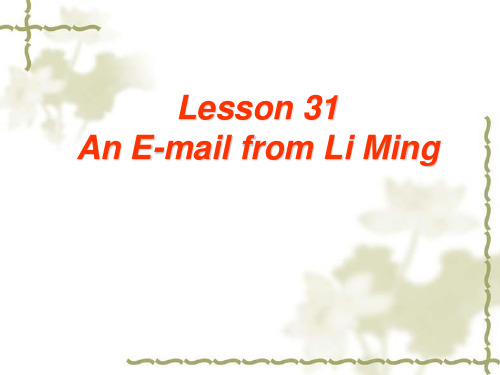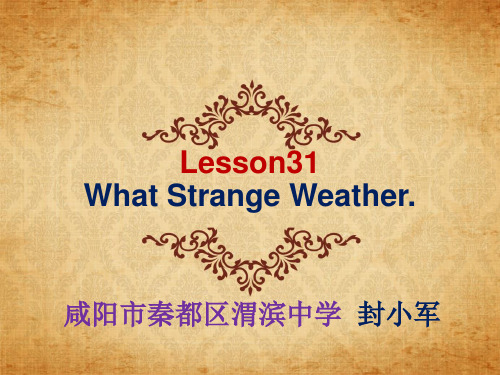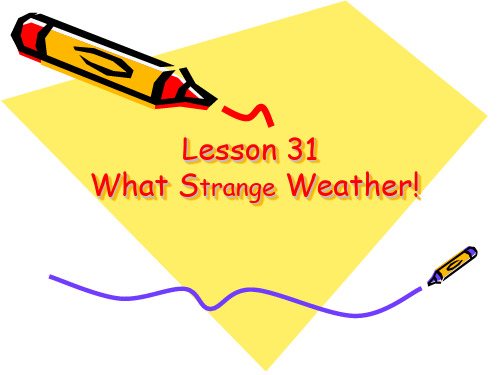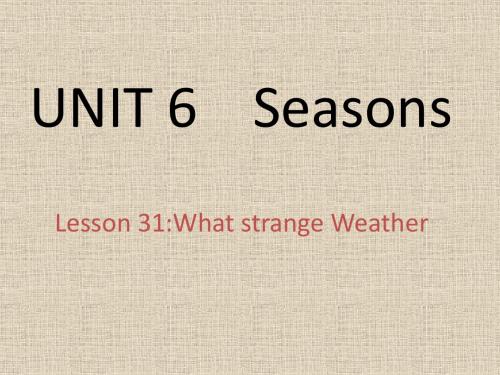2019年秋季冀教版七年级下册英语Lesson-31
七下英语冀教版31课课文

七下英语冀教版31课课文The Importance of Preserving Endangered LanguagesLanguage is the foundation of human communication and cultural expression. It is not merely a tool for conveying information; it is a reflection of a people's history, traditions, and worldview. However, in today's rapidly globalizing world, many of the world's languages are under threat of extinction. It is estimated that nearly half of the approximately 7,000 languages spoken around the globe are endangered, with one language disappearing every two weeks.The loss of these endangered languages is a grave concern, as it represents the erosion of irreplaceable cultural and linguistic diversity. Each language is a unique repository of knowledge, wisdom, and artistic expression, shaped by the experiences and perspectives of the people who speak it. When a language dies, it takes with it a wealth of information about the natural world, traditional practices, and ways of understanding the human experience.The causes of language endangerment are manifold and complex. Colonization, urbanization, and the dominance of a few global languages, such as English, have all contributed to the marginalization and decline of smaller, less-powerful languages. Economic and social pressures often compel speakers of endangered languages to abandon their mother tongue in favor of a more widely spoken language, which is perceived as offering greater opportunities for education, employment, and social mobility.Moreover, the rapid pace of technological and cultural change has disrupted traditional ways of life, eroding the contexts in which endangered languages are typically used. As younger generations increasingly adopt the language and cultural practices of the dominant society, the intergenerational transmission of endangered languages is often interrupted, leading to language shift and eventual language loss.The consequences of this language loss are far-reaching and profound. When a language dies, it takes with it a unique perspective on the world, a distinct way of understanding and engaging with the environment, and a rich tapestry of stories, songs, and cultural traditions. The loss of this linguistic diversity impoverishes our collective human experience and diminishes our understanding of the diverse ways in which humans have adapted to and thrived in different environments.Furthermore, the loss of endangered languages has significant implications for our scientific and academic understanding of the world. Many endangered languages contain specialized knowledge about local ecosystems, traditional medicinal practices, and other forms of traditional ecological knowledge that are invaluable to fields such as anthropology, biology, and linguistics. The disappearance of these languages means the loss of irreplaceable data and insights that could inform our understanding of the natural world and human societies.In recognition of the immense value of linguistic diversity, there have been growing efforts to preserve and revitalize endangered languages around the world. These efforts often involve collaborations between linguists, anthropologists, and members of the language communities themselves, with the goal of documenting, teaching, and promoting the use of endangered languages.One such initiative is the Endangered Languages Project, a global initiative that aims to document, support, and raise awareness about the world's endangered languages. The project provides a platform for language communities, researchers, and activists to share information, resources, and best practices for language preservation and revitalization.Another example is the work of indigenous language immersion schools, which have been established in many parts of the world to teach endangered languages to children and young adults. These schools not only help to maintain the language but also foster a sense of cultural identity and pride among the younger generations, who are often the key to the long-term survival of endangered languages.In addition to these grassroots efforts, governments and international organizations have also taken steps to protect and promote linguistic diversity. The United Nations Educational, Scientific and Cultural Organization (UNESCO) has declared International Mother Language Day, celebrated annually on February 21st, to raise awareness about the importance of linguistic diversity and to promote the preservation of endangered languages.However, despite these efforts, the challenge of preserving endangered languages remains daunting. The forces of globalization, economic pressures, and social change are powerful and persistent, and the task of revitalizing a language that is on the brink of extinction is often a long and arduous process.Nevertheless, the preservation of endangered languages is a crucial task, not only for the sake of the language communities themselves but for the benefit of all humanity. By safeguarding the world'slinguistic diversity, we are not only honoring the rich cultural heritage of our species but also ensuring that we maintain access to a wealth of knowledge and perspectives that can enrich our understanding of the world and our place within it.In conclusion, the preservation of endangered languages is a matter of profound importance, both for the language communities themselves and for the broader human community. By recognizing the value of linguistic diversity and taking concrete steps to support the revitalization of endangered languages, we can ensure that these unique and irreplaceable forms of cultural expression continue to thrive and enrich our shared human experience.。
冀教版英语七年级下册教案 Lesson 31 What Strange Weather

Lesson 31 What Strange Weather!教学设计【教学目标】1.Master the words and phrases:strange, notice, wake, --;wake up, go away, go swimming--2.Let Ss use exclamatory sentences, simple past tense, simple present tense and simple future tense correctly.【教学重难点】重点:掌握本课重点单词、短语及句型。
难点:让学生能正确使用感叹句、一般过去时、一般现在时和一般将来时。
【课时安排】1课时【授课时间】2020年( )月( )日星期( )【教学过程】一、导入环节(2分钟)(一)导入新课,板书课题导入语:Good morning, class. How are you? Today, we are going to learn:Lesson 31 What Strange Weather!(二)出示学习目标过渡语:First ,let’s read the learning goals together.1.我要掌握单词和短语:strange, notice, wake, --;wake up, go away, go swimming--2.通过学习,我要学会正确使用感叹句、一般过去时、一般现在时和一般将来时。
过渡语:I believe everyone can achieve your goal? Can you ? Let’s begin .二、先学环节(15分钟)过渡语:First look at the guides carefully and then finish the tasks step by step.(一)出示自学指导1.读课文,划出不熟悉的单词、短语和句子2.完成自学检测(二)自学检测反馈Ⅰ.根据句意及汉语提示完成句子1.Mr. Smith was also at the party yesterday evening. Did you ________(注意到) him?2.I'm afraid to go to the basement(地下室). It's too ________(黑暗的).3.That man looks ________(奇怪的). He always carries a big bag.4.I hope to ________(成为) a useful man in the future.【Keys】1.notice 2.dark 3.strange 4.becomeII.英汉互译1.醒来____________2.消失____________3.去游泳/滑雪/滑冰____________4.have snowball fights____________5.good work ____________e out _________ 【Keys】1.wake up2.go away3.go swimming/skiing/skating4.打雪仗5.做得好6.出现,出来III.根据汉语完成句子1.真是一个大雪天!day!2.多么奇怪的天气!weather!3.我们在一天几乎经历了四个不同的季节!We are four in one day!4.我想让你就最喜欢的季节写一份报告。
冀教版七年级下册 Lesson 31 An E-mail from Li Ming课件

E-mail from Li Ming
Dear
Jenny and Danny, Thank you for your invitation! I have some good news. My parents said yes! I can come as soon as you are ready. By the way, here are some pictures of our trip to Beijing. I had a great time with you in Beijing. I like Tian’anmen Square and the Palace Museum. I liked our hotel. I liked the Great Wall. I liked going to Wagnfujing to buy gifts. The picture of the panda is for Danny. The panda is in
bedroom
Think about it
Would you like to live with your best friend? Why or why not? Where would you live: at his / her home or yours? Why? Why is Danny excited?
The picture of the panda is for Danny. 这张 熊猫照片是给丹尼的。 the 是定冠词,用法如下: 指特定的人或物 “这(那)个;这(那) 些”。例如: the river 这条河 指已提到的或正谈到的人或物。例如: Who was the visitor? 来访者是谁? 指独一无二的事物。例如: the sun/the moon/the sky/the east 太阳/月 亮/天空/东方 用于乐器名称前。例如:
冀教版英语课件七下lesson31课件

(D )2. ____ day it is! It’s rainy again. A. How bad B. What a fine C. How fine D. What a bad day是单数名词, 解析:
且下雨是坏天气。
( B)3. beautiful flowers they are! • A、How B、What • C、How a D、What a flowers是名词的复数形式。 •解析:
•
What a beautiful •3.______ • picture it is ! How beautiful the •4.______ • pictures are! How high the •5._____. ____ hard work it is! • A. How B. What • C. What a D. What an work 为不可数名词。 •解析:
【学以致用】
成为中学生之后,她变得外向了。 •She became outgoing after she became a middle school student.
前者表示“变得”,后者表示“成为”。
•3.surprised 惊奇的,修饰 人; surprising 令人惊奇 的, 修饰物。 I'm surprised at
( A )4. terrible weather it is! •A、What B、What a C、How D、How a weather是不可数名词。 •解析:
( D )5. Open the window, and the bad smell will _______. •A.go out B. go off •C. go down D. go away go away 表示气味消失了。 •解析:
冀教版英语七年级下册 Lesson 31 What Strange Weather! (共26张PPT)

Right now the sky becomes dark. It’s going to rain.
What a cloudy day it is!
What a foggy day it is !
How goggy it is !
What a windy day it is !
How windy it is!
How is the weather in Edmondon today?
What strange weather!
What a snowy day it is! When I woke up in the morning.
What a sunny day!
Then the sun came out!
• • • • • • • • •
1.我对这部令人吃惊的电影感到很吃惊。 I amvery(surprised)atthe(surprising)movie. 2.我注意到那个人进入到了房间。 I noticed the man(go into) the room. 3.多么晴朗的天气啊! (What)sunny weather it is! (How)sunny it is! 4.让我们一起滑雪吧!Let’s (go skiing). 5.今天天气怎么样?( How is the weather today?or What’s the weather like today?)
a boy hard he is what
What a hard boy he is !
hard how the boy is
How hard the boy is !
• Prctice 用所给词的适当形式填空。 notice dark strange wild wake
冀教版英语七年级下册 Lesson 31 What Strange Weather!(共22张PPT)

morninglater源自thenevening
Listen to the tape and fill in the table.
Name Steven Jenny Kim Danny Favourite Season
Spring Summer Autumn Winter
Look at these pictures. Talk about your favorite season. Why is it your favorite season?
5. go+v.-ing go skiing go climbing
go swimming go shopping
Fill in the blanks.
In the morning, it was snowy ______ . Then the sun came ______ out and it became warm. ______ All the snow ______ went ______ away . Later, the sky is ______ ______ dark . It’s going to ______ rain . What strange weather ______ .
dark snowy
went away strange weather
came out rain
Homework
• Finish off Exercises 3--4 in “Let’s Do It!”. • Write a report about your favorite season.
UNIT 6 Seasons
Lesson 31:What strange Weather
冀教版英语七年级下册 Lesson 31 What Strange Weather!(共24张PPT)

1.Read and fill in the blanks in your book.
2.Read and do Exercise 4 in your book .
5.天气变热了,我可以去游泳了。 The weather __________ and I can _______. 6.你们还可以打雪仗。 You can ______ have ___________. 7.明天早晨你能叫醒我吗?
Can you _______tomorrow morning?
Write a short passage about
your favourite season.
What’s your favourite season? How is the weather? What can you do in the season?
Thank you!
summer
weather
summer activities food
What a big apple it is! What big apples they are!
Autumn—the harvest season
colorful
nice and cool pick up
What a big snowball it is!
1.----Do you ____ that Nancy has been a
little too quiet days? ----Yes. She didn't even say a word this afternoon. A.hope B.notice C. explain D. decide 2._____fine day! Shall we go for a walk? A.What B.How C. What a D. How a
七年级英语下册Lesson31教材内容详解冀教版

Lesson 31An from Li Ming来自李明的一封电子课文英汉对照THINK ABOUT IT! 想一想!●Would you like to live with your best friend? Why or why not?你想和你最好的朋友住在一起吗?●Where would you live: at his / her home or yours? Why?你将住在哪儿? 在他/她家里或你家?为什么?●Why is Danny excited?丹尼为什么兴奋?From : Li-Mingnet.寄件人:Li-Mingnet.TO:收件人:Subject : Good news!主题:好消息!Date:10/02 9:04PM日期:10月2号晚9:04Dear Jenny and Danny,亲爱的詹妮和丹尼,Thank you for your invitation! 感谢你们的邀请!I have some good news.我有一些好消息。
My parents said yes!我父母同意我(去)! I can e as soon as you are ready.只要你一准备好,我就出发。
By the way, here are some pictures of our trip to Beijing. 顺便说一下,这儿有几X我们去旅行的照片。
From :寄件人:TO: Li-Mingnet.收件人:Li-Mingnet.Subject :Re Good news!主题:回复好消息!Date:11/02 9:04AM日期:11月2号上午9:04Dear LiMing,亲爱的李明:I’m very happy to hear your good mews!听到你的好消息,我很高兴!And thank you for the pictures!My parents say 并且感谢你寄的这些照片!我的父母亲说you can e when you are ready .My teacher .Mr 当你准备好的时候你就可以来。
- 1、下载文档前请自行甄别文档内容的完整性,平台不提供额外的编辑、内容补充、找答案等附加服务。
- 2、"仅部分预览"的文档,不可在线预览部分如存在完整性等问题,可反馈申请退款(可完整预览的文档不适用该条件!)。
- 3、如文档侵犯您的权益,请联系客服反馈,我们会尽快为您处理(人工客服工作时间:9:00-18:30)。
eg:A dictionary tells you what words mean. 词典是给你解释词义的(工具书)。
考向 询问某个词或句子是什么意思的常用句式: What does...mean?What's the meaning of...? What do you mean by...?“……是什么意思?”
experiencing almost four different seasons in one
day!Now, class, I want you to write a report about your favourite season. Why is it your favourite season?What do you like about that season? Steven:Well,I love spring!It is spring right now. And spring usually means❺ green trees, beautiful flowers and playing in the rain. Jenny:I like summer. The weather turns hot and I can go swimming❻. Kim:Autumn is my favourite season. It's so colourful and the weather is nice and cool.
讲解来自《点拨》
拓展 (1)mean后跟动词的-ing形式或动词不定式作宾语 。
mean to do sth. 打算做某事
What do you mean to do tomorrow? 你明天打算做什么?
mean doing sth. Success means working hard. 意味着做某事 成功意味着努力工作。
(2)mean的名词形式是meaning,意为“意思;含义” 。
讲解来自《点拨》
知识点 6 go swimming 去游泳 考向 “go+动词的-ing形式”表示去进行某项活动。
常用短语:go skiing去滑雪;go skating去滑冰; go shopping去购物;go fishing去钓鱼;go boating去划船;go hiking徒步旅行。 eg:I went skating yesterday.
Let's Do It !
1) What are the students’ favourite seasons? Listen and fill in the table.
Name Steven Jenny Kim Danny
Favourite Season spring summer autumn/fall winter
孩穿着一件白衬衣。 章等。
讲解来自《点拨》
put on dress in
强调穿的动作,宾 Put on your coat, 语可以是衣服、鞋 because it's cold.穿
上你的外套,因为 帽等。
天冷。
其后通常接人作宾 I can dress myself.
语。
我会自己穿衣服。
介词,后接衣服或 I like the girl in red.
昨天我去滑冰了。
讲解来自《点拨》
知识点 7 wear/weə/v.穿着;戴着 eg: Li Ming is wearing a blue coat today. 李明今天穿着一件蓝色外套。
考向 辨析wear,put on,dress和in
强调穿的状态, 其宾语可以是衣 The boy is wearing wear 服、装饰品、奖 a white shirt.那个男
Danny:Yeah!Then the sun came out and it became❹ warm. All the snow went away.
Kim:And right now the sky is dark. It's going to rain. Mr. Jones:Yes, you're right. What strange weather!We are
使某人吃惊的是 doctor.使我吃惊的是,
surprise
他是一位非常著名
n.
的医生。
In surprise吃惊地 He looked up in surprise.
他惊讶地抬起头。
讲解来自《点拨》
魔法
一语辨异:I'm surprised to hear the surprising
记忆
news.我听到这个令人吃惊的消息感到很吃惊。
Danny:Well, I like winter. The weather is cold and there is a lot of snow. You can go skating and skating. You can also have snowball fights. But you have to wear❼warm clothes.
2. It's getting___d_a_r_k__.I must go home. 3. What time do you usually _w_a_k_e__u_p_every morning? 4.Our teacher changed her hair style. Do you __n_o_ti_c_e__that? 5.Sometimes the sea is quiet and sometimes it's very_w_i_l_d__.
Let's Do It !
4) Fill in the blanks with the words or phrase in the box.
notice dark strange wild wake up
1.The man always sleeps in the day and works at night. That is very _s_t_r_a_n_g_e_.
注意到某人做某事的全过程;notice sb. doing sth.注意到某人正在做某事。 eg:Did you notice him go out?
你注意到他出去了吗?
讲解来自《点拨》
I noticed his hands shaking. 我注意到他的手正在抖。 拓展 notice还可作名词,意为“通知;启事”。 eg:There's a notice on the wall.墙上有一则通知。
讲解来自《点拨》
典例 2
____D____your sunglasses,Sally. The sun is
so bright.(呼和浩特)
A.Put down
B.Put up
C.Put away
D.Put on
【点拨】本题可用语境推断法,由后句意思可知“阳光太 亮了”,所以前句应为“戴上你的太阳镜,萨莉。”
Let's Do It !
2) What was the weather like that day? Read the lesson and put the weather descriptions in the correct order. 1.Right now the sky is dark. 2.All the snow went away. 3.The sun came out and it became warm. 4.What a snowy day! 5.It's going to rain. The correct order is:__4__3__2__1__5__
get
渐变得”,后常接形容词 的比较级。
and darker outside. 外面变得越来越暗。
指在颜色、性质等方面 Leaves turn yellow
turn 与以前完全不同,强调 in autumn.叶子在秋
变化的结果。
天变黄。
grow
表示逐渐变成新的状态, 强调变化的结果。
My little sister is growing taller.我的 小妹妹逐渐长高了。
2019-2020学年度上期
2019年9月最新PPT课件
Lesson 31 What Strange Weather!
词课
汇 堂课 听 导文
写入
课
1
堂 …小
结
课课 堂后 练作 习业
课文 呈现
知识 讲解
……
……
同学们,上一课学习的单词你们都掌握了吗?现在 大家来检验一下,点击下面的音频开始听写吧!
典例 看到他赢得了比赛我们感到吃惊。 We __a_r_e_ _s_u_r_p_r_is_e_d_ __t_o__see he won the game.
【点拨】本题主语是人,故应用surprised。“做某事很吃 惊”用“be surprised to do sth.”。
知识点 4 become/bɪ'kʌm/ v.变成
Let's Do It !
3) Match the pictures with the exclamatory sentences. What a snowy day! What beautiful flowers they are! What a hot, sunny day! What cool weather it is!
讲解来自《点拨》
知识点 2 wake/weik/v.醒
考向 woke/wəʊk/v.是wake/weɪk/的过去式,过去分词 是woken,意为“醒”,常与up搭配使用。
sb. wake(s) up 某人醒来
